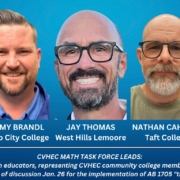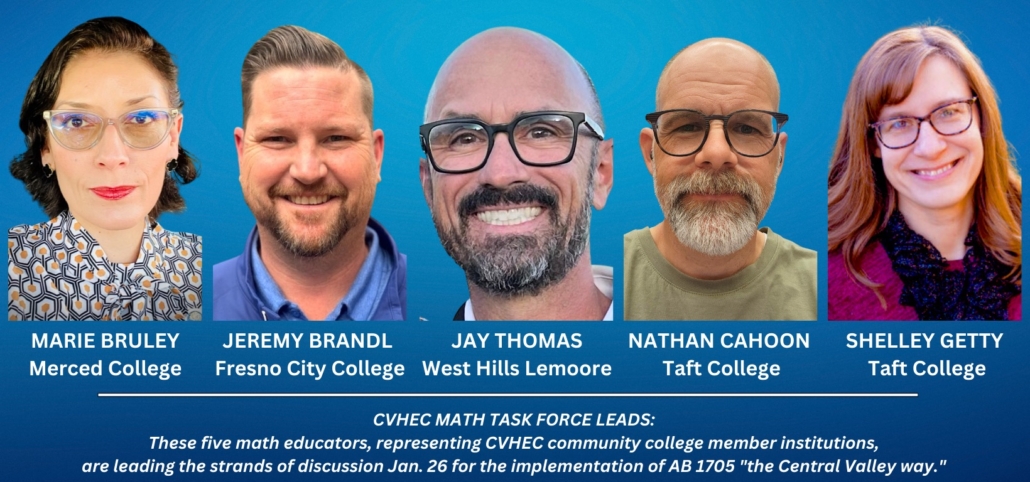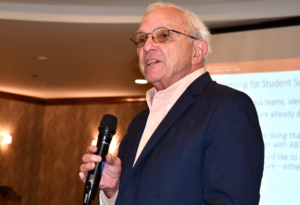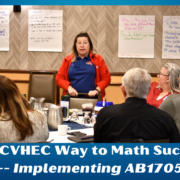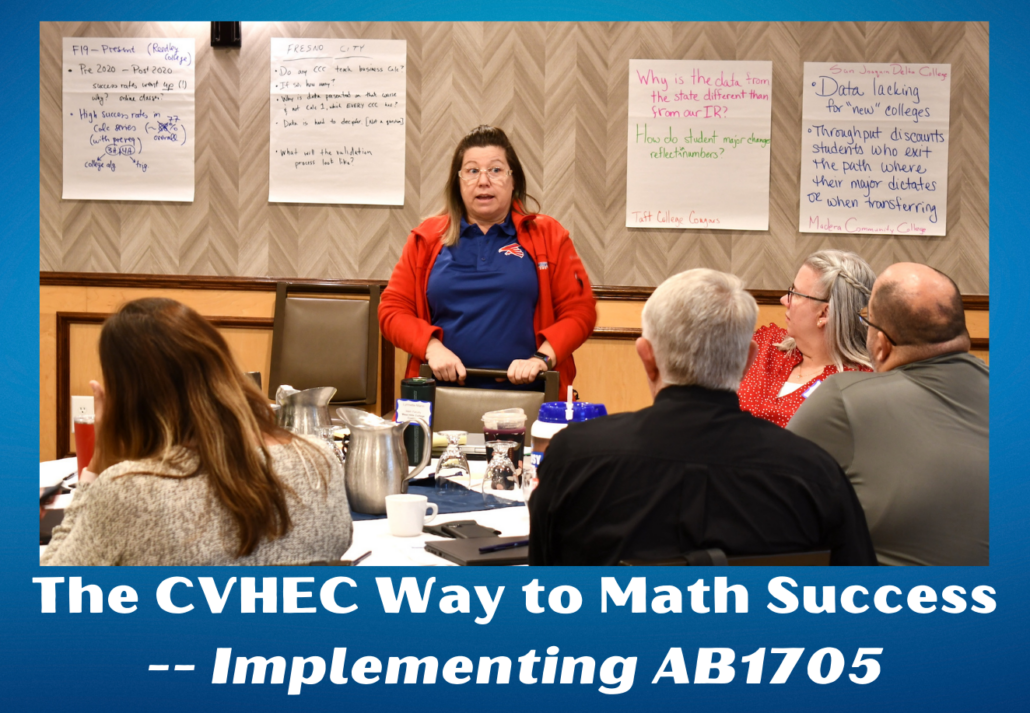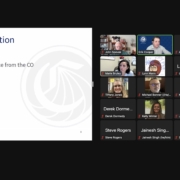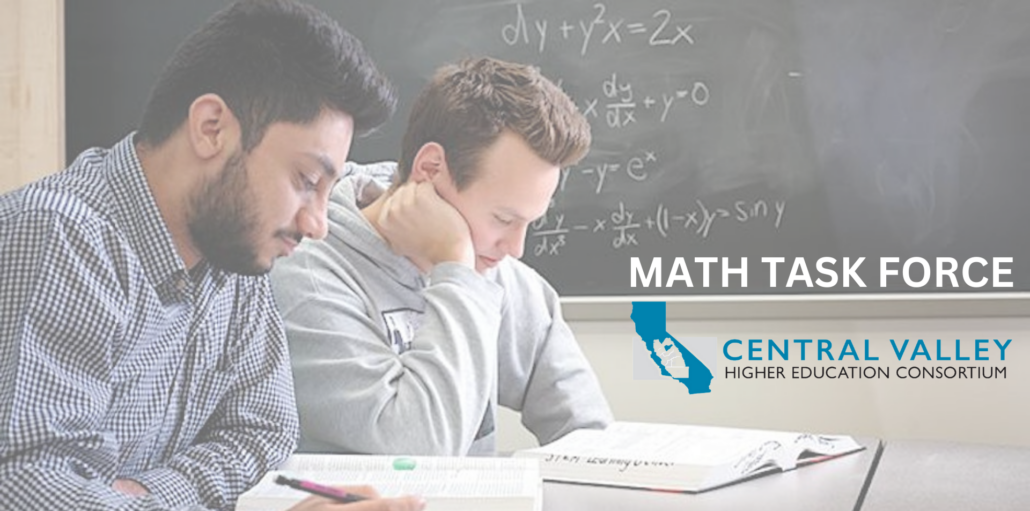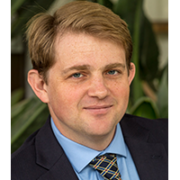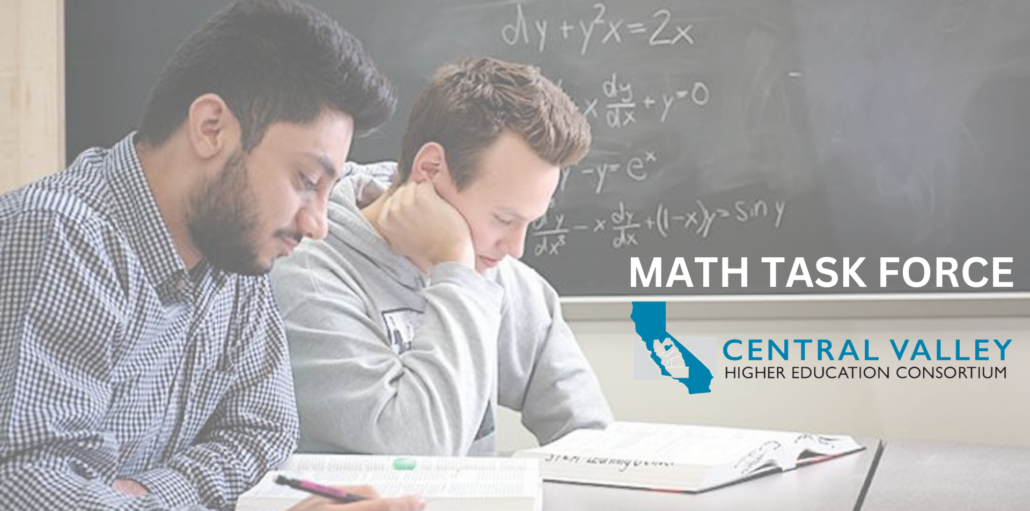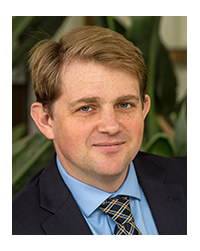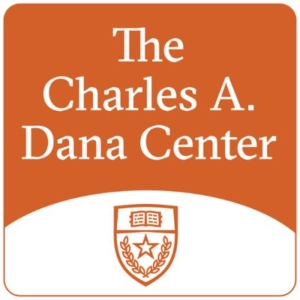Valley’s math ed experts unite to address AB 1705 challenge for student success
Math Task Force Convening Jan. 26:
‘Central Valley Way To AB1705 Success’
With the agenda released this week, over 60 Central Valley math education experts will convene in Fresno Jan. 26 to plan math pathways for student success as they brainstorm within five strands of implementation around Assembly Bill 1705 that goes into effect this summer.
The Central Valley Higher Education Consortium’s “Central Valley Way To AB1705 Success” Convening from 9 a.m. – 3 p.m. at the DoubleTree by Hilton Hotel Fresno Convention Center, will bring together community college math educators, administrators and institutional researchers.
Presented by the CVHEC Math Task Force and facilitated by the Charles A. Dana Center at the University of Texas at Austin, the convening is free with advance registration and includes lunch.
Discussion for the historic convening — with administrators and IR experts joining in the conversation — will center around five strands that the region’s community college math academicians can undertake for student success when the new law goes into effect July 1: Validating Prerequisites; Designing Precalculus for 2025; Math Support Outside and Inside the Classroom; Building an AB 1705 Campus Team; and Guided Self-Placement.
Five Math Task Force members serving as strand leads are: Jeremy Brandl, Fresno City College math professor; Nathan Cahoon and Shelley Getty, both Taft College math professors; Marie Bruley, Merced College dean of Science, Technology, Engineering, and Math (STEM); and Jay Thomas, West Hills College Lemoore math professor.
After the event opens with a welcome and brief introductions, the strand subcommittees open the discussion by presenting reports regarding preliminary strand deliberations over the past few months that started at three meetings the Math Task Force held in the fall.
Participants will then break into tabletop talks for feedback and to brainstorm new ideas, a timeline and next steps followed by report outs of those subcommittee sessions.
Following lunch, the participants will break into their respective college teams to discuss “Preliminary College Plans” in two parts: “Validating Prerequisites Between Now and July 1, 2024;” and “Developing New/Revised Curriculum to Take Effect July 1, 2025.”
“College Team Report Outs” will follow before the final session “Where Do We Go From Here?” looks towards the future and the role of Math Task Force sub-committees, college teams and CVHEC.
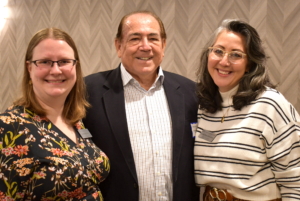
Dr. Benjamín Durán of CVHEC with Dana Center reps Joan Zoellner and Tammi Perez-Rice at the Oct. 13 Math Task Force convening in Fresno.
Dr. Benjamín Durán, CVHEC executive director, said, “We are proud that our Central Valley community colleges are leaning in on the expertise of their own math experts to figure out the best way to support our students within the guidelines of the legislation.”
AB 1705 — passed in 2022 for implementation July 1, 2024 — expands the provisions established in AB 705 (2017) by explicitly requiring community colleges not only to place students directly into transfer-level English and math courses but also to ensure that students actually enroll in those courses.
The legislation also establishes that for students who need or desire extra academic support, community colleges shall provide access to such support. The new law clarifies that a community college can require students to enroll in additional concurrent support if it is determined that the support will increase the student’s likelihood of passing transfer-level English or math.
Community colleges have been tasked with ensuring they comply with both AB705 and AB1705 designed to strengthen support for student success and increase degree completion.
CVHEC helped start the conversation by bringing together its Math Task Force — made up of representatives from CVHEC community colleges — and other math educators to discuss ideas and options regarding implementation within the Central Valley community college mathematics community last fall.
In three virtual sessions and one in-person convening in 2023, the Math Task Force created a collaborative “Central Valley Approach” to each, said Dr. John Spevak, CVHEC regional coordinator who oversees the consortium’s Math and English Task Forces.
“Now, for the January session, administrators and researchers are joining the Math Task Force to develop data-driven and college-endorsed solutions that help meet the challenge head on and in unity for the best interests of students.”
The fall inaugural sessions were facilitated by two Dana Center representatives who will return to Fresno for the Jan. 26 convening: Joan Zoellner, M.A., who is the lead for the Dana Center’s Launch Years Initiative; and Dr. Tammi Perez-Rice, Postsecondary Course Program specialist.
Dr. Erik Cooper, assistant vice chancellor of the California Community College Chancellor’s Office Cooper, also participated in the first virtual session to discuss the recent history of math education reform in California and answer questions as well as present the CCCCO’s AB 1705 Implementation Guide and FAQ webpage.
“With the passage of AB 705 then later 1705 – all designed to strengthen support for student success – CVHEC has been moving full steam ahead in assuring that our member colleges and their feeder high schools have a good understanding of the seemingly turbulent waters of the legislation,” Durán said.
Strand breakdown:
- Validating prerequisites — quantitative and qualitative: creating a Central Valley collaborative approach which would help make a strong case with the state. Point person: NATHAN CAHOON, Taft College math professor.
- Designing Precalculus for 2025: An effective single-course prerequisite for Calculus 1 (especially valuable if the state allows in 2025-26 only one prerequisite course for Calculus 1). Point person: JEREMY BRANDL, Fresno City College math professor.
- Math support outside and inside the classroom: What’s working best in the Central Valley, including math lab centers, tutoring, embedded tutoring, supplemental instruction, etc. Point person: SHELLEY GETTY, Taft College math professor.
- Building an AB 1705 campus team: Who needs to be on the team? Math and English professors, IR/IT staff, counselors, administrators, etc. How does it best function? Point person: MARIE BRULEY, Merced College dean of Science, Technology, Engineering, and Math (STEM).
- Guided self-placement: Helping ensure with the best possible questionnaire that students are taking the right math class when they start college. Point person: JAY THOMAS, West Hills College Lemoore math professor.
(Links to recordings of the two previous sessions are available below).
REGISTER – “The CVHEC Way to Math Success — Implementing AB1705” (Jan. 26, 2024)
EVENT AGENDA For questions: centralvalleyhec@gmail.com.
For media inquiries: Tom Uribes 559.348.3278 (text msg) or cvheccommunications@mail.fresnostate.edu
SEE:
- Previous sessions recordings:
CVHEC “AB1705 in the Central Valley” Webinar with Dr. Erik Cooper Oct. 6, 2023
MTF meeting Nov. 17 (10 a.m. session)
MTF meeting Nov. 17 (1 p.m. session)
- Coverage of the fall sessions:
Math Task Force begins discussion of AB1705 implementation – Nov. 17 next (with Oct. 13 photo gallery).
CVHEC Math Task Force meets in-person Oct. 13 for AB 1705 follow-up
NEWS RELEASE – CVHEC Math Task Force: Impactful legislation (AB 1705) Convenings Oct. 6 & 13
- The CCCCO’s AB 1705 Implementation Guideand FAQ webpage.
- The CVHEC Math Task Force
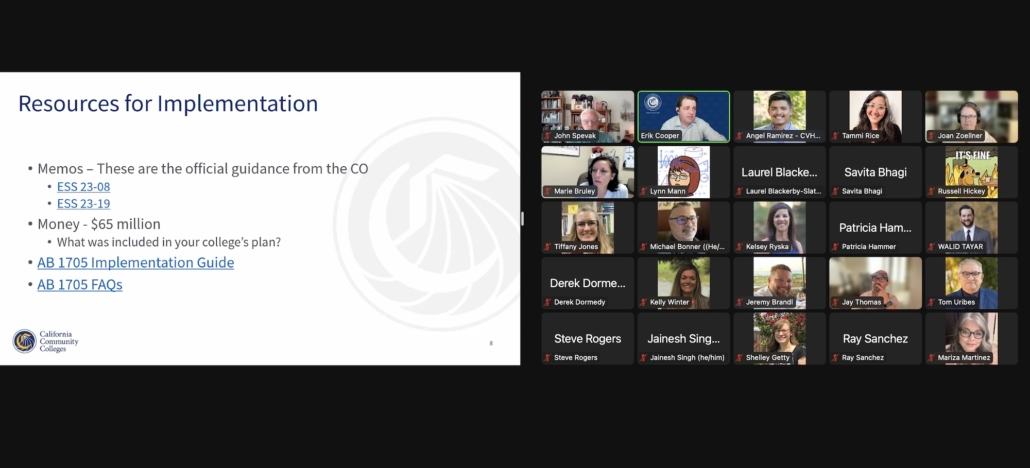
Dr. Erik Cooper of the California Community Colleges Chancellor’s Office zoomed into the Oct. 6 CVHEC Math Task Force session to address AB1705 implementation.

